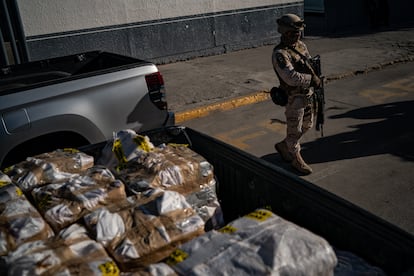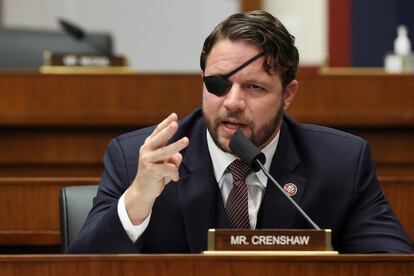Fentanyl: the Republican Party’s new ‘wall’ against Mexico
The conservative political establishment in the United States has capitalized on a massive public health crisis, betting on the demonization of Mexico as a strategy to win the 2024 presidential and legislative elections

Before, it was the wall. Today, it’s fentanyl.
Amid a deep public health crisis, the radical wing of the Republican Party has made a synthetic drug the cornerstone of its strategy ahead of the 2024 elections. Cheaper, deadlier and harder to detect, fentanyl has established itself as the new protagonist of the war against drug trafficking and of the conflict between the most conservative sectors of the United States and the Mexican government in recent weeks.
From the perspective of Trumpists and other hard-line Republicans, Mexico is to blame for the opioid epidemic. It’s the country that doesn’t do enough, that protects and embraces the drug cartels. It’s also the new political piñata, from which they’re hoping to get a bit of candy.
On the other side of the border, President Andrés Manuel López Obrador doesn’t intend to sit idly by – he has no qualms about ridiculing and denying the accusations. He has even mobilized the largest consular network in the world to counterattack and convince millions of Americans not to vote for candidates who espouse anti-Mexican discourse.
As with Donald Trump and the border wall, Republican leaders like Florida Governor Ron DeSantis – a 2024 presidential hopeful – have blamed immigrants for drug trafficking.
“We have people crossing illegally from every country in the world. And what has that brought us? Today, the leading cause of death among people ages 18 to 45 is fentanyl overdoses,” DeSantis said last year.
According to an Ipsos poll from August of 2022, about 53% of Americans agree that there is an “invasion” taking place at the southern border, while 39% opine that most of the fentanyl in the United States is being trafficked by undocumented immigrants… a percentage that rises to 60% among Republicans, even though it’s a false claim.
“If they don’t change their attitude and think that they can use Mexico for their propaganda and political purposes, we’re going to call for people not to vote for that party,” López Obrador warned in March.
The friction between the two countries – caused by insecurity – is persistent. However, the latest dispute began a few weeks ago, when it was announced that four Americans had been kidnapped in the border city of Matamoros. Two were ultimately found dead.
Criticism of the Mexican government’s security policy ended up resurrecting the proposal that the United States declare drug cartels to be terrorist groups, which would allow the Biden administration to undertake military operations beyond US soil.
This idea isn’t new. It was tossed around and dismissed during the Obama and Trump administrations. But, little by little, it has gained strength among the most conservative groups within the Republican Party.
Initially, it was easy to dismiss as an outlandish proposition with no prospect of success. The idea calls for the US military to attack fentanyl labs and traffickers in Mexico – with or without the permission of the Mexican government – to fight a scourge that, in 2021, claimed the lives of tens of thousands of people in the US. The premise is clear: Washington has to take justice into its own hands.
“All we want is to finally stand up to the powerful criminal groups that terrorize the Mexican people, bribe and threaten Mexican politicians, and poison Americans,” said Texan Congressman Dan Crenshaw, the author of the bill.
Although this proposal has already been ruled out by the Biden administration, López Obrador has still felt the need to make it clear that the proposal is unacceptable and beyond the norms of international law.
“Who do these cruel, interventionist, arrogant people think they are? Mexico is to be respected,” the president emphasized.
An old political hand, López Obrador took advantage of the criticism against his country to launch his own. First, he fired off against the Republicans, reminding them that Mexico “is not a protectorate or a colony of the United States.” Later on – despite assuring that bilateral relations were in good health – he criticized the role played by agencies such as the DEA and the State Department in Mexican territory, with statements such as “Mexico is much safer than the United States,” “we don’t produce fentanyl here,” or “no country fights drug-trafficking like Mexico does.” This last statement was pronounced by Mexico’s Secretary of Foreign Relations, Marcelo Ebrard.

The Mexican government is emphasizing that the White House cannot afford to cut off security cooperation with its neighbor and that it’s time for the United States to recognize its responsibility in the opioid crisis, as the world’s leading drug consumer. Despite all the inflamed rhetoric, a diplomatic rupture is still unlikely, both due to the interdependence between the two countries and a global context characterized by the Russian invasion of Ukraine and tensions with China.
The consumption of fentanyl in Mexico is minimal and, furthermore, the notion that the Republican claims are unfair is widely accepted in the country. The idea, however, is gaining popularity among the Republican ranks. Fentanyl poses a real threat to American society. The DEA has called this synthetic opioid – which is legally used in pain treatments and as an anesthetic – “the deadliest drug threat our nation has ever suffered.”
The impact is palpable. At the end of 2022, the Centers for Disease Control and Prevention (CDC) announced that life expectancy in the US had fallen to its lowest level in two decades, partly due to the increase in overdose deaths. Those who have died from the use of fentanyl were mostly under the age of 40.
Fentanyl is easy to traffic. It can be hidden in vehicles, in suitcases and in the clothes of those who cross the border. DEA agents seized 14,000 pounds of fentanyl in 2022 – a record amount.
Republican politicians have already made fentanyl-trafficking one of their big election issues. The GOP base perceives this drug as the greatest threat to public health: 37% of Republican-leaning voters indicate this to be the case, according to an Ipsos survey published in February of this year. But attitudes towards trafficking differ widely by party affiliation: only 17% of Democratic supporters think that the drug is being moved by undocumented immigrants.
The idea of using forceful measures against insecurity and drug-trafficking has gained ground among Republican elected officials. The route of military intervention is becoming a political priority in the party, especially for congresspeople and presidential candidates. Former President Trump – the frontrunner in the Republican race – privately supports the idea, according to Rolling Stone.
Hard-right legislators – such as Marjorie Taylor Green of Georgia, or Beth Van Duyne of Texas – have publicly spoken out in favor of military intervention into Mexico. As has GOP White House hopeful Nikky Haley, who visited the border last week and called for special forces to be sent to Mexico to deal with cartels “like we did with ISIS.”
Meanwhile, another minor candidate for the Republican nomination – millionaire Vivek Ramaswamy – has tweeted that “Biden sits in the White House and follows the fentanyl crisis as if he were a bystander. I will use our army to annihilate the cartels.”
Since earlier this year, a report by a conservative think tank has been circulating, advocating for a formal declaration of war against the cartels, in response to the “ever-growing pile of corpses of Americans killed by fentanyl poisoning.” The author of the text is Ken Cuccinelli, the former top immigration official during the Trump era, who now supports the potential presidential campaign of Florida Governor Ron DeSantis.
In the House of Representatives, Representatives Dan Crenshaw of Texas and Michael Waltz of Florida have introduced a bill that would authorize the use of American military force in Mexico. In the Senate, South Carolina’s Lindsey Graham and Louisiana’s John Kennedy have introduced their own proposal to “authorize the armed forces to attack these organizations (the drug cartels and distributors) wherever they may be.” William Barr – a former attorney general under the Trump administration – has also championed the proposal in an editorial published in The Wall Street Journal.
Graham has assumed the leadership of the anti-Mexican crusade in recent weeks, taking advantage of Biden cabinet secretaries appearing before the Senate. He has questioned Secretary of State Anthony Blinken and Secretary of Homeland Security Alejandro Mayorkas.
“We have to take off the gloves. They’re at war with us – we have to go to war with them,” he told Mayorkas last week. Under heated questioning, Blinken conceded that there were parts of Mexico under the control of the cartels, but commented that designating the cartels as terrorist organizations “would not provide any new tools.” The White House has expressed a similar view.
“The cartel threat isn’t a problem that needs a few high-precision guided [projectiles], or one that is solved simply by changing the name of [its] legal status,” says Kimberly Breier, who served as assistant secretary of state for Western Hemisphere Affairs under Trump. She adds that, while the proposals that have been circulating are politically lucrative – especially in light of the upcoming presidential campaign – they “misdiagnose the nature of the problem and will do little to resolve it.”
In the midst of the exchange of accusations with López Obrador, US diplomats and delegations of legislators have visited Mexico to keep the dialogue between the two countries open. Based on these exchanges, the Mexican president released a letter this week in which he asked his Chinese counterpart, Xi Jinping, to combat illegal trafficking “for humanitarian reasons.”
“The United States must face its own problems,” the Chinese government responded.
Beijing condemned the interference in the sovereignty of Mexico, but stressed that it was not going to assume any responsibility as the epicenter of drug manufacturing. The DEA claims that Mexico and China are the main sources of the fentanyl consumed in the United States.
The forecast of most analysts is that, far from stopping, the Republicans will continue to stir up the electoral piñata of “Mexican fentanyl.” López Obrador has not shown signs of backing down, either. Nothing is new: neither the tensions nor the reproaches nor the exaggerations.
Ultimately, it remains to be seen what the balance will be in the communication and collaboration between the two countries, in light of nationalist discourses initially branded as “for internal consumption,” but which are increasingly disturbing the bilateral relationship. The implications of this rhetoric may change radically next year, when new presidents are elected on both sides of the border.
Sign up for our weekly newsletter to get more English-language news coverage from EL PAÍS USA Edition
Tu suscripción se está usando en otro dispositivo
¿Quieres añadir otro usuario a tu suscripción?
Si continúas leyendo en este dispositivo, no se podrá leer en el otro.
FlechaTu suscripción se está usando en otro dispositivo y solo puedes acceder a EL PAÍS desde un dispositivo a la vez.
Si quieres compartir tu cuenta, cambia tu suscripción a la modalidad Premium, así podrás añadir otro usuario. Cada uno accederá con su propia cuenta de email, lo que os permitirá personalizar vuestra experiencia en EL PAÍS.
¿Tienes una suscripción de empresa? Accede aquí para contratar más cuentas.
En el caso de no saber quién está usando tu cuenta, te recomendamos cambiar tu contraseña aquí.
Si decides continuar compartiendo tu cuenta, este mensaje se mostrará en tu dispositivo y en el de la otra persona que está usando tu cuenta de forma indefinida, afectando a tu experiencia de lectura. Puedes consultar aquí los términos y condiciones de la suscripción digital.








































